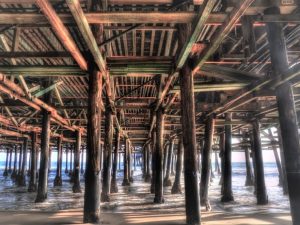Advantages of Using Timber
- Timber works best in wet or compressed soil
- Cheaper than other pile materials
- It can be bonded together to increase length of the piles
- Installation is fairly quick compared to other piles
- Heavy equipment is not needed to install piles
- Timber can be a flexible material so they are able to withstand impact from boats and waves
- Can have added strength with composite piling or wrapping
Disadvantages of Timber Piling
- Can deteriorate from rot, salt water, and insects
- Can’t be used with filled soil sites
- Can be costly to install pile caps for added stability
- When pile becomes weak, piles will need to be wrapped over time to save the supported structure from collapsing
- Joints between piles when bonded are weak so if a heavy structure is being supported, it will most likely collapse
- Loads that are too heavy can’t be supported by timber piles such as a warehouse
- Timber can be very hard or impossible to place into hard ground
Timber piling is a great building material, especially for marine structures. They are mostly used for piers, bridges, and boardwalks. Timber piles work best along the water as they add a beautiful, natural look to the environment.


